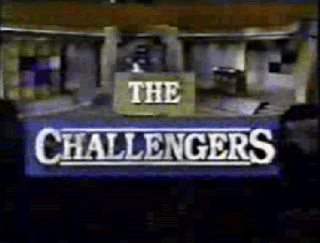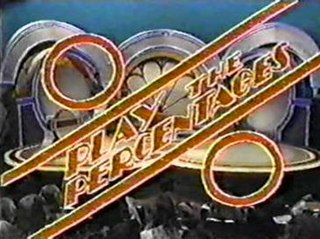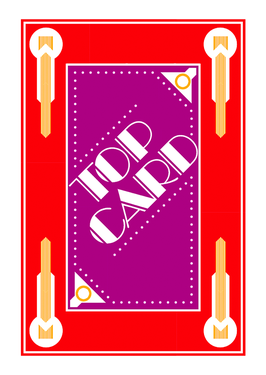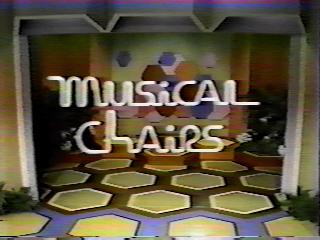Related Research Articles

Name That Tune is an American television music game show. Originally created and produced by orchestra conductor Harry Salter and his wife Roberta Semple Salter, the series features contestants competing to correctly identify songs being played by an on-stage orchestra or band.
The Joker's Wild is an American television game show that aired at different times between 1972 and 2019. In the show, contestants answer questions based on categories determined randomly by a mechanism resembling a slot machine. The show's title refers to the game's slot-machine mechanism also having jokers.

Now You See It is an American television game show created by Frank Wayne for Mark Goodson-Bill Todman Productions. The object of Now You See It is to answer general knowledge trivia questions by finding the answers hidden in a grid, similar to a word search puzzle.

Chain Reaction is an American television game show created by Bob Stewart, in which players compete to form chains composed of two-word phrases.

The Challengers is an American game show that aired in syndication from September 3, 1990, until August 30, 1991. The show remained in production for its entire run on the air, differing from most syndicated game shows which usually wrapped in the early summer.
Idiot Savants was an American television game show on the MTV network which ran from December 9, 1996, to April 25, 1997. It was created by Michael Dugan and Chris Kreski, directed by Steve Paley, and hosted by comedian Greg Fitzsimmons.
Double Talk is an American game show that aired on the ABC network from August 18 to December 19, 1986. The show was a Bob Stewart-produced word game which borrowed elements from Stewart's previous show Shoot for the Stars and his then-current editions of Pyramid.
Headline Hunters is a Canadian game show that appeared on CTV from 1972 to 1983. It was originally created by Nick Nicholson and E. Roger Muir. It was hosted by Jim Perry, who hosted two other Canadian game shows and several American game shows concurrently with its run. CFTO-TV meteorologist Dave Devall, who worked with Perry on the aforementioned two series, served as the announcer and was a de facto co-host for this series. It was a Glen-Warren Production for the CTV Television Network and was filmed at the Glen-Warren Studios in the Toronto suburb of Scarborough.
Time Machine is an American game show where contestants compete to answer trivia questions about popular culture and recent history to win prizes. The show aired on NBC from January 7 through April 26, 1985, and was hosted by John Davidson. Charlie Tuna was the announcer, with Rich Jeffries as his substitute. Reg Grundy Productions produced the series, and upon its premiere Time Machine was one of three Grundy series airing on NBC.

Play the Percentages is an American game show hosted by Geoff Edwards which aired in syndication from January 7 to September 12, 1980. Jay Stewart announced for the first six weeks, after which Bob Hilton became the permanent announcer.

Game Ka Na Ba?, formerly Pilipinas Game Ka Na Ba is a Philippine game show created by ABS-CBN. The main goal of the game is to win 2 million pesos by answering trivia questions.

Top Card is a game show that aired on TNN and produced by Reid-Land Productions, replacing TNN's original game show Fandango. The show aired from April 3, 1989 to March 26, 1993 and was based on the card game Blackjack.
Fandango is a country music-themed quiz show which aired on The Nashville Network from March 8, 1983 to August 26, 1988, with reruns airing through March 31, 1989, when it was replaced by Top Card. Fandango was the first TV game show to air on TNN and was one of the longest-running game shows on a cable network.

Musical Chairs is an American game show that aired from June 16 to October 31, 1975, on CBS. Singer Adam Wade hosted, making him the first African-American game show host. Wade had three Billboard top ten hits in 1961. The game show was recorded at the Ed Sullivan Theater in New York City and sportscaster Pat Hernon was the announcer. The show was created by Don Kirshner.
Burgo's Catch Phrase was an Australian game show that ran between 1997 and 2003, produced by Southern Star Group for the Nine Network. The show was based on the British and American versions of the programme, and was originally known simply as Catch Phrase until 1999 where the show was renamed as Burgo's Catch Phrase in honour of its host, John Burgess. The show was cancelled in 2003 after a revamp of the show and a hiatus in 2001. The show ended on 26 November 2003.

The Vault is a British game show based on the original Israeli version called HaKassefet Hebrew: הַכַּסֶפֶת) that aired on ITV from 11 May 2002 to 24 August 2004. It was first hosted by Davina McCall in 2002, then hosted by Melanie Sykes from 2003 to 2004 and finally hosted by Gabby Logan who stepped in for Sykes for the latter half of 2004 when Sykes went on maternity leave.

Three for the Money is an American game show produced by Stefan Hatos-Monty Hall Productions that aired on NBC from September 29 to November 28, 1975. Dick Enberg was the host with Jack Clark announcing. Enberg was also hosting Sports Challenge at the time and had just joined NBC's sports division.
Turn It Up! is a musical game show that aired on MTV from June 30 to December 7, 1990. It was the second game show to be produced and broadcast on the network after Remote Control, produced by Albie Hecht, Alan Goodman, and Fred Seibert, of Chauncey Street Productions in New York City.
Rumor Has It is an American daily game show that aired on the cable channel VH1 from June 7 to October 28, 1993. Brian O'Connor was the host and John Ten Eyck announced.
Face the Music was a weekly game show from New Zealand that aired on TV2 from 1992-1994, hosted by TV presenter Simon Barnett, along with Dwayne Francks as co-host. Jeoff Barraclough was the announcer.
References
- ↑ Schwartz, David; Ryan, Steve; Wostbrock, Fred (1999). The Encyclopedia of TV Game Shows (3 ed.). Facts on File, Inc. p. 220. ISBN 0-8160-3846-5.